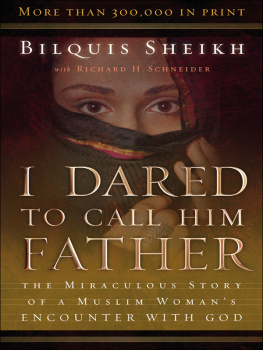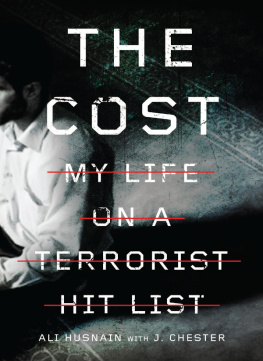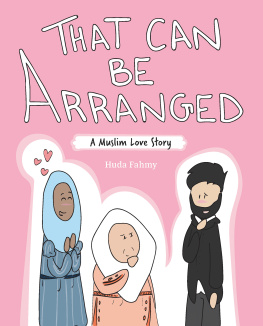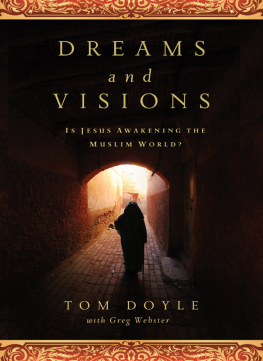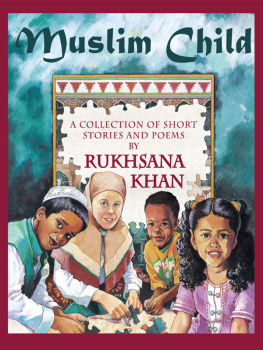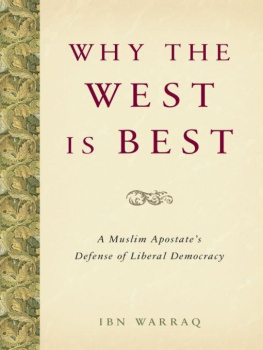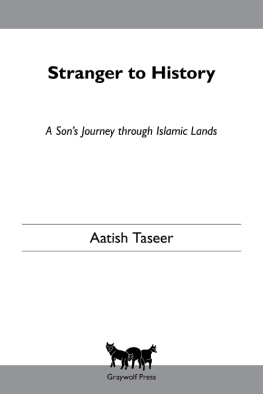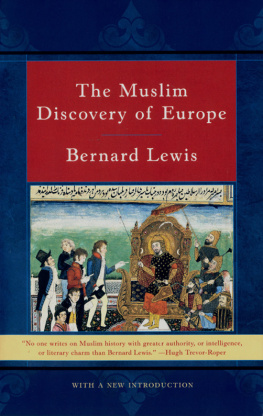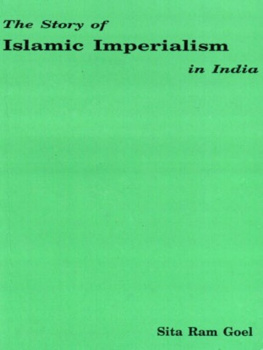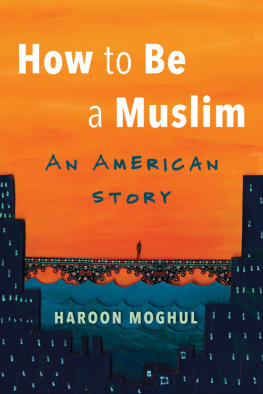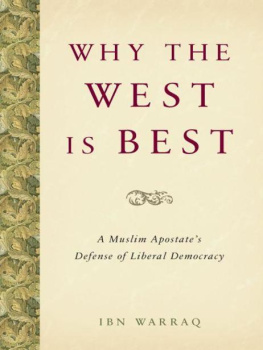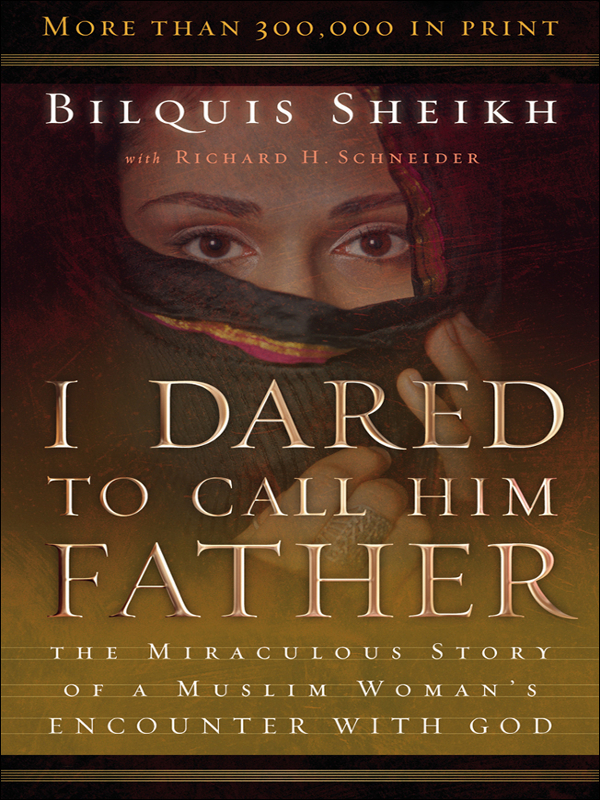
I DARED
TO CALL HIM
FATHER
I DARED
TO CALL HIM
FATHER
THE MIRACULOUS STORY
OF A MUSLIM WOMANS
ENCOUNTER WITH GOD
Bilquis Sheikh
with Richard H. Schneider

1978, 2003 by Bilquis Sheikh
Published by Chosen Books
a division of Baker Publishing Group
P.O. Box 6287, Grand Rapids, MI 49516-6287
www.chosenbooks.com
E-book edition created 2011
All rights reserved. No part of this publication may be reproduced, stored in a retrieval system, or transmitted in any form or by any meansfor example, electronic, photocopy, recordingwithout the prior written permission of the publisher. The only exception is brief quotations in printed reviews.
ISBN 978-1-4412-0784-5
Library of Congress Cataloging-in-Publication Data is on file at the Library of Congress, Washington, DC.
Old Testament Scripture quotations are from the King James Version of the Bible.
Unless otherwise indicated, New Testament Scripture quotations are from the New Testament in Modern English, translated by J. B. Phillips. Copyright 1958, 1960, 1972 by J. B. Phillips. Used by permission of Macmillan Publishing Co., Inc.
Scripture marked NASB is taken from the NEW AMERICAN STANDARD BIBLE. Copyright The Lockman Foundation 1960, 1962, 1963, 1968, 1971, 1972, 1973, 1975, 1977, 1995. Used by permission.
Scripture marked NIV is taken from the HOLY BIBLE, NEW INTERNATIONAL VERSION. NIV. Copyright 1973, 1978, 1984 by International Bible Society. Used by permission of Zondervan. All rights reserved.
The verse by Rudyard Kipling is excerpted from Rudyard Kiplings Verse: DefinitiveEdition. Reprinted by permission of Doubleday and Company, Inc.
To my grandson Mahmud
my little prayer partner
who has been a source of joy and comfort to me
through many lonely hours
Contents
The strange prickly feeling grew inside me as I walked slowly along the graveled paths of my garden. It was deep twilight. The scent of early narcissus hung heavy in the air. What was it, I wondered, that made me so uneasy?
I stopped my walk and looked around. Inside my home some distance across the broad lawn the servants were beginning to flick on lights in the dining area. Outside all seemed peaceful and quiet. I reached out to snip off some of the pungent white blossoms for my bedroom. As I leaned over to grasp the tall green stems, something brushed past my head.
I straightened in alarm. What was it? A mist-like cloud a cold, damp unholy presencehad floated by. The garden suddenly seemed darker. A chilling breeze sprang up through the weeping willows and I shivered.
Get hold of yourself, Bilquis! I scolded. My imagination was playing tricks on me. Nevertheless, I gathered my flowers and headed quickly toward the house where windows glowed in warm reassurance. Its sturdy white walls and wooden doors offered protection. As I hurried along the crunchy gravel path I found myself glancing over my shoulder. I had always laughed at talk of the supernatural. Of course there wasnt anything out there. Was there?
As if in answer, I felt a firm, very real and uncanny tap on my right hand.
I screamed. I rushed into the house and slammed the door behind me. My servants ran to me, afraid to make any comment at all, for I must have looked like a ghost myself. It wasnt until bedtime that I finally found the courage to speak to my two maids about the cold presence.
Do you believe in spiritual things? I asked, on concluding my story.
Both Nur-jan and Raisham, one a Muslim, the other a Christian, avoided answering my question, but Nur-jan, her hands fluttering nervously, asked me if she could call the village mullah, a priest from the mosque, who would bring some holy water to cleanse the garden. But my common sense had returned and I rebelled at submitting to the superstition of the ignorant. Besides, I didnt want any word of this to spread in the village. I tried to smile at her concern, and told her, a little too abruptly Im afraid, that I didnt want any holy man on my grounds pretending to remove evil spirits.
Nevertheless, after the maids left the room, I found myself picking up my copy of the Quran. But after struggling through a few pages of the Muslim holy book, I wearied of it, slipped it back within its blue silken case, and fell asleep.
I awakened slowly the next morning like a swimmer struggling to the surface, a thin, high chant piercing my consciousness:
Laa ilaaha illa Ilaah,
Muhammed resolulla!
The sing-song words drifted through my bedroom window:
There is no God but Allah:
And Muhammed is his Prophet.
It was a comforting sound, this Muslim call to prayer, because it seemed so utterly normal after the previous night. It was a call I had heard almost without exception every morning of my 54 years. I envisioned the source of the rolling chant.
Some moments before in the little nearby Pakistani village of Wah, our old muezzin had hurried through the door at the base of an ancient minaret. Inside its cool interior he had trudged up curving stone steps worn smooth by the sandals of generations of Muslim holy men. At the top of the prayer tower, I could imagine him hesitating at the carved teak door leading to the parapet to catch his breath. Then, stepping outside to the railing, he threw back his bearded head and in syllables fourteen hundred years old called the faithful to prayer.
Come to prayer, come to salvation,
Prayer is better than sleep.
The haunting cry floating through the morning mist across cobblestone lanes in Wah still cold from the October night drifted across my garden to curl along the houses brick walls now ruddy in the light of the rising sun.
As the last wisps of the ancient chant hung above me, I remembered the eerie experience in the garden the night before, and quickly turned to morning routines that would be comforting just because they were so ordinary. I sat up and reached for the bell on my bedside table. At its musical tinkle, my maid Nur-jan hurried in out of breath as usual. Both of my maids slept in a room adjoining mine and I knew that they had already been up for an hour, waiting for my call. Morning tea in my bed was a must. Nur-jan began laying out my silver brushes and combs. She was a willing teen-aged girl, plump and giggly, but a bit clumsy. When she dropped a brush, I scolded her sharply.
Raisham, my other maid, older and quieter, a tall graceful woman, slid into the room bearing a large covered tea tray. She placed it on my bed table, drew back the white linen to expose the sterling service and poured me a cup of steaming tea.
Sipping the scalding ambrosia, I sighed in satisfaction; tea was better than prayer. My mother would have been shocked at my thought. How many times had I watched her place her prayer rug on the tiled bedroom floor, then, facing the holy city of Mecca, kneel and press her forehead to the rug in prayer. Thinking of my mother I looked over to the dressing case on my table. Fashioned centuries ago of sandalwood and covered with engraved sterling silver, it had belonged to Mother and her mother before her. Now it was my heirloom to treasure. After finishing two cups of tea I leaned forward, a sign for Raisham to begin brushing my graying waist-length hair while Nur-jan carefully worked on my nails.
As the two worked, they gossiped in easy familiarity about news from the village, Nur-jan chattering and Raisham making quiet, thoughtful comments. They talked about a boy who was leaving home for the city and a girl soon to be married. And then they discussed the murder that happened in a town where Raishams aunt lived. I could sense Raisham shudder as the news came up. For the victim had been a Christian. She was a young girl who had been staying in a Christian missionarys home. Someone had stumbled across her body in one of the narrow lanes criss-crossing her village. There was supposed to have been an investigation by the constabulary.
Next page
